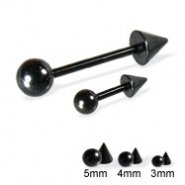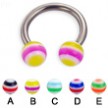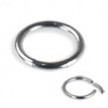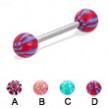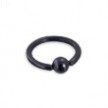Black straight barbell with ball and cone, 16 ga
- Gauge (Thickness): 16 (1.2mm)
- Material: titanium coated 316L surgical stainless steel
- Type: straight barbell
Shown: 14mm barbell with 5mm balls, 6mm barbell with 4mm balls.
Note: you will receive one barbell.
| Click on the picture to see a big picture and description of the body jewelry you are interested in. | |||||||||
|---|---|---|---|---|---|---|---|---|---|
|
Titanium circular barbell with circle balls,...
$8.49
Titanium circular barbell with circle balls, 12 ga
Shown: 13mm circular barbell with 6mm balls. |
Segment ring, 12 ga
$7.99
Segment ring, 12 ga
Shown: 13mm captive bead ring. |
Straight barbell with acrylic checkered balls,...
$2.99
Straight barbell with acrylic checkered balls, 14 ga
Shown: 16mm straight barbell with 6mm balls. |
Titanium anodized black captive bead ring,...
$7.99
Titanium anodized black captive bead ring, 14 ga
|
||||||
Niobium
An elemental metal, strong yet flexible; slightly heavier than 316L stainless. Niobium is non-reactive chemically; few people are sensitive to niobium. The wide array of colors achieved through anodizing (not dyeing), in which the jewelry is submerged in an electrolite solution. Anodizing forms an oxide layer on the jewelry. The color seen is light refracted through this layer; the thickness of the layer determines the particular color produced. The voltage applied during anodizing determines the thickness of the oxide layer and hence the resulting color. The anodized layer of oxide will eventually wear away; how long the process will take depends on how thick the oxide layer is and the amount of friction and wear on the jewelry. Some colors will start to fade within 6 months.
Matte black is achieved by heating the niobium until it is red-hot and cooling it. After blackening, the jewelry can be polished to a certain degree. Black niobium will not fade; rather, it will deepen and grow smoother with age and wear.
Niobium jewelry is available in matte (“satin”) or high-polish (“mirror”) finishes. Very rough-finished niobium should not be used for fresh/unhealed piecings, as the pores present in the matte finish can trap bacteria as well as retain polishing-compound residue which can be toxic. The rough finish will also have a tendency to “stick” to new piercings via dried discharge, which can cause the newly-formed tissue to rupture, extending healing time.
